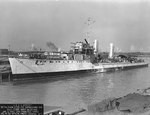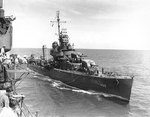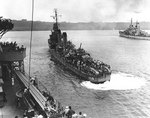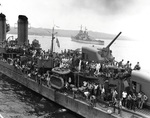Laffey (Benson-class)
| País | Estados Unidos |
| Classe de Navio | Contratorpedeiro da Classe Benson |
| Estaleiro | Bethlehem San Francisco Shipyard |
| Data de Quilha | 13 jan 1941 |
| Data de Lançamento | 30 out 1941 |
| Data de Incorporação | 31 mar 1942 |
| Data de Afundamento | 13 nov 1942 |
| Deslocamento | 1,620 tons standard |
| Comprimento | 348 feet |
| Boca | 36 feet |
| Calado | 12 feet |
| Velocidade | 37 knots |
| Tripulação | 208 |
| Armamento | 4x5in, 2x20mm, 3x21in torpedo tubes, 5 depth charge projectors, 2 depth charge tracks |
Contributor: C. Peter Chen
ww2dbaseWith Lieutenant Commander William E. Hank in command, Laffey held her shakedown cruise off the west coast of the United States. She headed for the South Pacific in mid-1942, arriving at Efate on 28 Aug 1942. On 6 Sep, she joined Task Force 18. On 15 Sep, she helped rescuing survivors from the sunken carrier Wasp. On 18 Sep, she joined Task Force 64. She first saw battle in the Battle of Cape Esperance on 11 and 12 Oct 1942, where she helped to repulse a Japanese bombardment group. On 12 Nov, while escorting transports, she underwent a heavy air attack. On the next day, she was engaged in the First Naval Battle of Guadalcanal, in which she was one of the eight destroyers and five cruisers under the overall command of Admiral Daniel J. Callahan. During the battle, Laffey followed destroyer Cushing on a torpedo run, followed by destroyer Sterett. After Cushing fired her spread of six torpedoes at battleship Hiei (which all missed), Cushing drew attention of the Japanese big guns, and was sunk by 14-inch shells. Laffey followed suit with her torpedoes, while her 5-inch guns roared at the direction of Aoba. Like Cushing's, Laffey's torpedoes also failed to hit Hiei, but unlike Cushing's torpedoes which simply went wide, Laffey's torpedoes were fired too close to Hiei, therefore there was not enough time for the torpedoes to become armed. After expending her torpedoes, she found herself trapped by two Japanese battleships and two destroyers. Her 5-inch guns and other smaller weapons fired toward port side at Kirishima's superstructure as she attempted to make her way out of the envelopment, killing Japanese Chief of Staff Masakane Suzuki as her machine guns raked Kirishima's bridge. Suddenly, two consecutive salvos from Kirishima rained down all around her, with at least one 14-inch shell hitting her on her midships superstructure. A moment later, she was hit at the stern by a torpedo from destroyer Teruzuki. Dead in the water, the order to abandon ship was given, but before most of the men able to evacuate, a violent explosion in her after ammunition magazines ripped the destroyer apart, causing her to sink immediately. Her wreck is now about half-mile below the surface of Iron Bottom Sound, upright and largely intact except for her after third.
ww2dbaseSources: United States Navy Dictionary of American Naval Fighting Ships, United States Navy Naval Historical Center.
Last Major Revision: Aug 2007
Destroyer Laffey (Benson-class) Mapa Interativo
Photographs
 |  |  |  |
Laffey (Benson-class) Operational Timeline
| 31 mar 1942 | Laffey (Benson-class) was commissioned into service. |
| 25 out 1942 | United States Navy Task Force 64 consisting of USS Washington, USS Atlanta, USS San Francisco, USS Helena, USS Lardner, USS Lansdowne, USS Buchanan, USS Fletcher, USS Walke, USS Benham, USS McCalla, USS Aaron Ward, and USS Laffey bound for Savo, Solomon Islands was joined by USS Nicholas as an additional escort. As Nicholas came alongside Washington to exchange mail, Nicholas struck Washington’s side. The battleship was undamaged but Nicholas sustained hull damage from her anchor being pressed into the ship. Nicholas was able to resume her full duties immediately, however. |
| 13 nov 1942 | Cruiser USS Atlanta was sunk by Type 93 torpedoes launched from Japanese destroyer Akatsuki; destroyer USS Barton was sunk by Type 93 torpedoes launched from Japanese destroyer Amatsukaze; and destroyer USS Laffey was sunk by Type 93 torpedoes launched from unidentified Japanese destroyers. |
Você gostou deste artigo ou achou este artigo útil? Se sim, considere nos apoiar no Patreon. Qualquer valor já vai ajudar! Obrigado. Por favor, ajude-nos a divulgar o site: Fique atualizado com WW2DB: |
Visitor Submitted Comments
All visitor submitted comments are opinions of those making the submissions and do not reflect views of WW2DB.

» Guadalcanal Campaign
 |
- » 1,182 biografias
- » 337 eventos
- » 45,119 entradas na linha do tempo
- » 1,249 navios
- » 350 modelos de aeronaves
- » 207 modelos de veículos
- » 376 modelos de armas
- » 123 documentos históricos
- » 261 instalações
- » 470 resenhas de livros
- » 28,415 fotos
- » 365 mapas
Winston Churchill
Por favor, considere nos apoiar no Patreon. Mesmo R$1 por mês já faz uma grande diferença. Obrigado!
Ou, por favor, nos apoie adquirindo alguns produtos do WW2DB na TeeSpring. Obrigado!
4 Jan 2017 10:17:13 PM
My father was a U.S. Navy Higgins boat operator November 13, 1942 looking for survivors after the sea Battle of Guadalcanal. He saw an oil covered man waving on Savo Island and picked him up. The man was a carpenter's mate who reported he was on the USS Laffey below decks when the ship blew up and he's found himself swimming in the water.
In the dark, he began swimming and then apparently noticed something touching his legs, which frightened him. Then he felt it began pushing him. He stated it pushed him several miles to Savo Island. The man had a cut on his buttocks from the dorsal fin of the animal that pushed him, most probably a dolphin. My research indicated there were two carpenters mates on the USS Laffey one of whom survived with injuries. My father reported he attempted to pick up other survivors including Japanese, however the Japanese refused rescue and in one case pointed a pistol at themselves and at my father to prevent him from rescuing them.